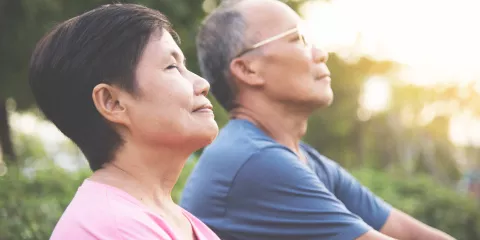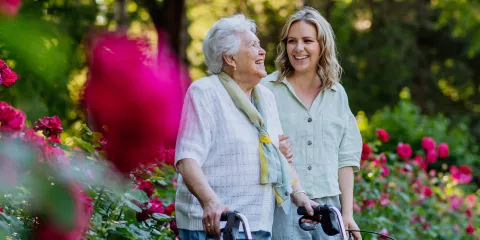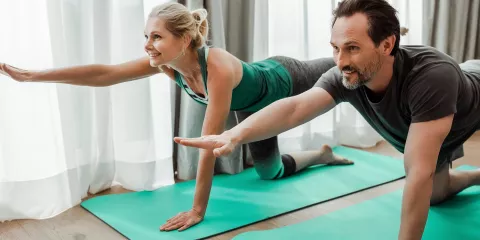
The brain is an amazing organ that scientists are just beginning to understand. One thing we’ve learned is that our brains need exercise as much as our bodies do to stay healthy as we age.
Dancing, practicing yoga, playing online games and meditating provide benefits for our brains and overall health. Here’s how such activities help us stay sharp in our older years.
Dancing
Along with the cardio fitness it provides, dancing gives our brains a solid workout.
Choose any dance you think you’ll enjoy -- ballroom, Latin, country, swing, folk, tap or line dancing. Learning new steps and lead-follow partnering requires complex mental coordination, and uses both long- and short-term memory functions.
Researchers from the Albert Einstein College of Medicine investigated the effect 11 different types of leisure activities had on the risk of dementia in older adults.
For 21 years, they studied cognitive activities (reading books, playing cards, doing crossword puzzles), as well as physical activities, such as tennis, golf, swimming, bicycling, dancing and walking.
Their research showed that dancing was the only physical activity associated with a lower risk of dementia, perhaps because dancing involves both mental exercise and social interaction.
When was the last time you went dancing? Get started by visiting your local dance studio for beginning group classes or private lessons in whatever type of dance you like.
Parks and Recreation Departments of many cities also offer group classes and are a fun, inexpensive way to start moving. You don’t need a partner to get started, because students rotate with each other in group classes.
So get out there and start grooving to the music!
Yoga Practice
Doing yoga poses like downward dog relaxes us, puts us in a positive frame of mind, and can improve our mental health through its mind-body connection.
The part of the brain that helps us concentrate our attention on specific things was also found to be larger in those who practice yoga.
A University of Illinois study of 30 female undergraduate students found that a single, 20-minute session of Hatha yoga significantly improved their speed and accuracy on tests of memory and inhibitory control -- brain functions associated with our abilities to maintain focus and take in, keep and use new information.
Our brains have a lot to gain from a weekly yoga practice.
A 2014 Scientific American article mentions research, done by the National Center for Complementary and Alternative Medicine, that detected more gray matter (brain cells) in certain areas for people who regularly practiced yoga compared with control subjects.
The mental map of our body and the hippocampus, the section that helps us squash stress and anxiety, were both larger in the heads of yogis.
The part of the brain that helps us concentrate our attention on specific things was also found to be larger in those who practice yoga.
All of these are good reasons to try a yoga class. Check out local yoga studios, gyms, and community colleges to start working on bending, stretching and balance -- along with improving your brain.
Or, buy a yoga DVD and begin at home.
Related Article: 11 Yoga Poses for Strength and Flexibility
Playing Online Games
Even before Pokémon GO burst onto the scene, research showed playing video and computer games can improve cognitive skills in older adults.
Complex, challenging and ambitious, many online games push us up to the edge of our abilities via increasingly demanding levels. Learning and practicing challenging tasks this way involves the brain processes of attention, perception and problem solving.
Playing video and computer games can improve cognitive skills in older adults.
A study by the University of Iowa showed adults ages 50 and older who played just 10 hours of a game called “Road Tour” delayed declines in brain-processing speed and agility by between three and seven years.
Playing computer or video games may also help maintain reasoning, spatial perception, visual sharpness and memory. And not to be overlooked is the positive value of socialization gained through playing with partners from around the world.
Action, sports, adventure, puzzles, role playing and strategy games are available in Apple’s App Store or Google Play, sometimes for free. Ask your friends and family the online games they most enjoy playing.
Mindfulness Meditation
Mindfulness meditation is most easily practiced sitting with your eyes closed and paying attention while breathing in and out.
When your attention wanders, return to focus on your breath. In doing so, you become mindful -- acutely aware of yourself in the present moment.
Parks and Recreation Departments of many cities also offer group classes and are a fun, inexpensive way to start moving.
As we relax and “clear our minds” this way, how is it good for our brains?
Sara Lazar, a neuroscientist from Harvard Medical School, showed through research and brain scans that meditating an average of 27 minutes per day can literally modify our brains after just eight weeks.
Four areas of the brain improved which assist in learning, cognition, memory and emotional regulation.
There are several ways to learn to meditate -- through books or articles, participating in online courses, or visiting a local yoga center. It’s a personal practice unique to each individual, so start the learning method with which you feel most comfortable.
Namaste.












